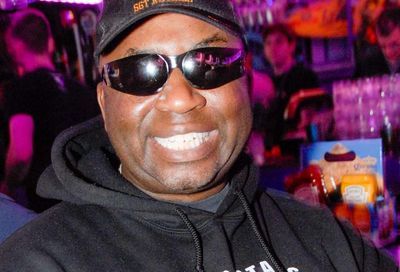Teachers Could Lose Licenses for Violating “Don’t Say Gay” Law
Florida Department of Education approves rules to censor teachers' speech, and push for sex-segregated restrooms.

On Wednesday, the Florida Department of Education adopted a rule that would yank licenses from teachers found to have addressed subject matter related to LGBTQ issues — even tangentially — in violation of the state’s “Parental Rights in Education” law, dubbed by opponents as the “Don’t Say Gay” law.
The amendment to an existing rule on teacher conduct, first proposed in August by Florida Commissioner of Education Manny Diaz, Jr., seeks to enforce the law, which prohibits instruction on sexual orientation or gender identity in grades K-3 and requires that any LGBTQ-related material broached in older grades be “age-appropriate” and “developmentally appropriate” — though such designations are vague and largely based in opinion.
Under the approved rule, teachers who “intentionally” teach students in grades K-3 about gender identity or sexual orientation could have their license to teach suspended or revoked altoghether. However, it is unclear what criteria or evidence will be used to prove that a teacher has “intentionally” taught subject matter. Without further clarification, for example, it is possible that a teacher who merely intervenes to stop students from bullying a child with same-sex parents could be accused of violating the law or “indoctrinating” students.
Critics of the rule say its — and the larger “Don’t Say Gay” law’s — vagueness is a feature, not a bug, and is intended to force teachers to censor themselves in order to avoid making any statements that could be interpreted as being LGBTQ-supportive.
While a final rule has not yet been approved, critics question how the state will determine which teachers have their license suspended versus those that have them revoked.
Beyond LGBTQ issues, the rule would also penalize teachers found in violation of another law passed this year, the Stop WOKE Act, which was proposed as an anti-“critical race theory” bill and prohibits teaching subjects or concepts (as well as workplace trainings for privately-held companies) about race or sex that make people feel “guilt” or “anguish.” Under the law, teachers are prohibited from providing instruction or making comments that make some individuals feel they bear “personal responsibility” for historic wrongdoings because of their race, sex, or national origin.
Like with the “Don’t Say Gay” law, teachers found to have introduced or broached topics — say, for example, in a history class — such as modern-day examples of racism or discrimination will also be penalized and threatened with the loss of their licenses.
Alex Lanfranconi, the director of communications for the state education department, told the teaching trade publication Education Week that the department’s intention to enforce both laws should come as no shock.
“It should not be surprising that educators are at risk of having their certificates sanctioned if they violate state law,” Lanfranconi said in an emailed statement. “The proposed amendment will change nothing for teachers who follow the law and are focused on providing high-quality classroom instruction aligned to state academic standards.”
LGBTQ advocates have mounted two separate lawsuits against the “Don’t Say Gay” law specifically this year, arguing that the law violates the freedom of speech and equal protection of LGBTQ students, the children of same-sex couples, and families of LGBTQ students. A federal judge has dismissed one of the lawsuits on technical grounds.
Rin Alajaji, a public policy associate with Equality Florida blasted the rule for threatening teachers with loss of licensure for actions or words that any litigious parent believes violates the law, regardless of whether a neutral observer would agree.
“Teachers shouldn’t be punished or silenced for acknowledging and valuing every family,” Alajaji said. “This board is putting careers of educators in jeopardy and intensifying the harmful and chilling effects that the ‘Don’t Say LGBTQ’ law has already had in providing safe, inclusive and welcoming schools.”
Andrew Spar, the president of the Florida Education Association, the state’s largest teachers’ union, also criticized the rule as an attack on the teaching profession and a distraction from what issues schools should be focusing on.
“Our students would be better served if state officials and lawmakers focused less on threatening and punishing teachers, and more on retaining and recruiting them,” Spar told Education Week. “Florida has a severe shortage of both teachers and support staff. Bringing the culture wars into our classrooms will only make the situation worse.”
In addition to the rule about classroom content, the State Board of Education unanimously approved a rule requiring county school boards and charter schools to notify parents about school policies involving access to bathrooms and locker rooms.
“If a school board of charter-school governing board has a policy or procedure that allows for separation of bathrooms or locker rooms according to some criteria other than biological sex at birth, the policy or procedure must be posted on the district’s website or charter school’s website and must be sent by mail to student residences to fully inform parents,” part of the rule reads.
Schools will be required to notify parents which bathrooms and locker rooms “are not separated by biological sex at birth” — in other words, informing them if any special accommodations have been made for individual transgender-identifying or gender-nonconforming students. Parents will also be advised about methods of teacher or staff supervision in locker rooms, and how those methods ensure the “safety and privacy” of students.
Tom Grady, the chairperson of the State Board of Education, defended the rule to the Tampa Bay Times, arguing: “It’s parental notification. It’s not mandating what a particular bathroom looks like or doesn’t look like or who can use it.”
The 11th U.S. Circuit Court of Appeals, which oversees Florida, has previously ruled, in a case involving a Jacksonville-area transgender student, that school board policies barring trans youth from using facilities matching their gender identity are discriminatory. Additionally, guidance from the U.S. Department of Education has said that transgender students are covered by federal laws prohibiting sex-based discrimination — guidance which Education Commissioner Diaz has advised Florida schools to ignore.
Nikola Parker, the director of transgender equality for Equality Florida, criticized the restroom facilities rule for straying from federal guidance, arguing that it “mak[es] schools less safe and add[s] fuel to a politically motivated crusade against LGBTQ youth and their families.”
Support Metro Weekly’s Journalism
These are challenging times for news organizations. And yet it’s crucial we stay active and provide vital resources and information to both our local readers and the world. So won’t you please take a moment and consider supporting Metro Weekly with a membership? For as little as $5 a month, you can help ensure Metro Weekly magazine and MetroWeekly.com remain free, viable resources as we provide the best, most diverse, culturally-resonant LGBTQ coverage in both the D.C. region and around the world. Memberships come with exclusive perks and discounts, your own personal digital delivery of each week’s magazine (and an archive), access to our Member's Lounge when it launches this fall, and exclusive members-only items like Metro Weekly Membership Mugs and Tote Bags! Check out all our membership levels here and please join us today!
























